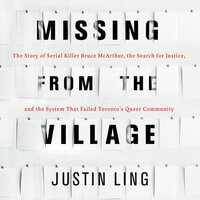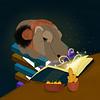Take a photo of a barcode or cover
2.5 Stars. I was so close to loving this until the ‘police only started to care because a white man went missing ad that’s wrong’ bit. I could rant about the insinuations of this being written off as a ‘wrong’ sentiment but I won’t and as a queer woc while I agree with his argument about social capital I’m still pissed he thought that dismissing that sentiment (which is a very real thing for queer poc) was a cool thing to do in a book highlighting queer (primarily) moc.
dark
emotional
informative
inspiring
reflective
medium-paced
An informative and emotional story, written by someone that knows how to write an accessible and compelling narrative. Does an okay job of evaluating privilege, especially as it relates to the story, and invokes a strong call to action.
I remember seeing Andrew Klinsman's missing posters all over my neighbourhood. I also remember following the case when Bruce McArthur was finally caught. After hearing the details I found myself wondering if the police would have taken things more seriously if the first victims had be straight, white men. Justin Ling's well written, well researched book does nothing to change my mind.
challenging
dark
informative
tense
medium-paced
emotional
slow-paced
dark
emotional
informative
reflective
sad
tense
medium-paced
My second queer, true-crime book in one month... not bad at all. I really enjoyed this book, and I thought Ling did a phenomenal job at considering, and bringing to the forefront of his book, the systemic issues that played MAJOR roles in this case going so long without being solved. There were a few excerpts within the book that I felt were a little too "memoir-esque" for what the rest of the book was; these moments just felt a little out of place and led to my 1 star deduction from my rating.
However, Ling was able to tell this story in a way that draws you deeper into the Toronto queer scene. I also liked how there Ling was researching these cases while things were unfolding before him; the writing mirrored this which led to a fun reading experience that made you feel like you were alongside Ling in his investigation.
The following quotes from the text reflect some key struggles for minorities in relation to law enforcement that I would like to pinpoint in my review:
“Hamid had a long running relationship with McArthur. Why weren’t those connections enough to paint McArthur as a suspect? The community may be a village, but there were so many obvious vectors between three missing persons and a man with an assault conviction for a violent, unprovoked attack against another gay man just blocks away from where these guys were last seen. Red flags should have been shooting up everywhere. But, not for the chief. He kept going, he did more than that… he doubled down. ‘McArthur had friends, family, loved ones. He would be in bars, he was Santa Claus and all these things, and, all the while, nobody knew. If anybody would know before us, it was people who knew him very, very well. And so that did not come out. And I’m not going to point fingers, because we’re passed that. With the loss of life, it is catastrophic here.’ He continued by asking, ‘What can we do better? Our role is to follow the evidence,’ the chief went on, ‘and if you don’t have any evidence, then you dig harder to see, to make sure, you do the checks, double checks with all these investigations. You don’t just sit back on your hands and go ‘Nothing’s coming, and see you later.’ We go out, we aggressively try to pursue and look for that. We knew that some people were missing, and we knew that we didn’t have the right answers, but nobody was coming to us with anything. Nobody.’”
- When I read this I was FURIOUS! However, I wasn't surprised in the slightest.
In response to the quote above:
"How much more do you expect from us? Do you expect this from other communities? To do your work for you?" "And how dare you? How dare you further victimize the people that are already not getting the good end of this deal--this societal deal that we have where we pay your salaries to do your job, and you don't do it. And when you do do it, you do it completely wrong, and your focus is completely wrong. There's so much to be angry at."
- I COULD NOT AGREE MORE!
“To be prioritized as a missing person, you need social capital. And social capital is not an infinite resource, it is not equally available to everyone. This is a fundamental, structural failure of the way every single police department in the world handles violence against marginalized people. Blame shouldn’t be exclusively reserved for the police. The queer community was built on the premise that if the structures of power that exist can’t or won’t do anything to protect them, the community would do itself. To do that, all the letters in the acronym, all the colors in the flag, were supposed to stand for each other. That dream has never been realized. Queer people of privilege's have generally not stood up for others in the community who have faced oppression or violence. The community should not have been a place where men disappeared with little notice or panic. Especially from the bars that were supposed to be safe havens.”
- I had never thought of it like this, but it makes SO MUCH SENSE! I think, too, that the queer community as a whole is somewhat responsible as well because of the lack of care given when these men disappeared from the scenes for which they considered to be a home of sorts.
Overall, I really enjoyed this book. It gets 4/5 Stars from me.
However, Ling was able to tell this story in a way that draws you deeper into the Toronto queer scene. I also liked how there Ling was researching these cases while things were unfolding before him; the writing mirrored this which led to a fun reading experience that made you feel like you were alongside Ling in his investigation.
The following quotes from the text reflect some key struggles for minorities in relation to law enforcement that I would like to pinpoint in my review:
“Hamid had a long running relationship with McArthur. Why weren’t those connections enough to paint McArthur as a suspect? The community may be a village, but there were so many obvious vectors between three missing persons and a man with an assault conviction for a violent, unprovoked attack against another gay man just blocks away from where these guys were last seen. Red flags should have been shooting up everywhere. But, not for the chief. He kept going, he did more than that… he doubled down. ‘McArthur had friends, family, loved ones. He would be in bars, he was Santa Claus and all these things, and, all the while, nobody knew. If anybody would know before us, it was people who knew him very, very well. And so that did not come out. And I’m not going to point fingers, because we’re passed that. With the loss of life, it is catastrophic here.’ He continued by asking, ‘What can we do better? Our role is to follow the evidence,’ the chief went on, ‘and if you don’t have any evidence, then you dig harder to see, to make sure, you do the checks, double checks with all these investigations. You don’t just sit back on your hands and go ‘Nothing’s coming, and see you later.’ We go out, we aggressively try to pursue and look for that. We knew that some people were missing, and we knew that we didn’t have the right answers, but nobody was coming to us with anything. Nobody.’”
- When I read this I was FURIOUS! However, I wasn't surprised in the slightest.
In response to the quote above:
"How much more do you expect from us? Do you expect this from other communities? To do your work for you?" "And how dare you? How dare you further victimize the people that are already not getting the good end of this deal--this societal deal that we have where we pay your salaries to do your job, and you don't do it. And when you do do it, you do it completely wrong, and your focus is completely wrong. There's so much to be angry at."
- I COULD NOT AGREE MORE!
“To be prioritized as a missing person, you need social capital. And social capital is not an infinite resource, it is not equally available to everyone. This is a fundamental, structural failure of the way every single police department in the world handles violence against marginalized people. Blame shouldn’t be exclusively reserved for the police. The queer community was built on the premise that if the structures of power that exist can’t or won’t do anything to protect them, the community would do itself. To do that, all the letters in the acronym, all the colors in the flag, were supposed to stand for each other. That dream has never been realized. Queer people of privilege's have generally not stood up for others in the community who have faced oppression or violence. The community should not have been a place where men disappeared with little notice or panic. Especially from the bars that were supposed to be safe havens.”
- I had never thought of it like this, but it makes SO MUCH SENSE! I think, too, that the queer community as a whole is somewhat responsible as well because of the lack of care given when these men disappeared from the scenes for which they considered to be a home of sorts.
Overall, I really enjoyed this book. It gets 4/5 Stars from me.
challenging
emotional
informative
tense
fast-paced
This book is justice. The justice that Bruce MacArthur's victims were denied for years. The police and investigators who should have protected them instead failed them. Not for the first time was Toronto's gay village let down by the TPS. The community that they had targeted with homophobic surveillance, raids, and arrests for decades. Toronto's queer community deserved better. This book is about Bruce Macarthur indirectly; thankfully it's focused on his victims and the history of policing in Toronto's gay village where he committed his crimes.
These men who were murdered were mostly BIPOC queer men, some Muslim, some struggled with addiction, some were refugees, one a sex worker experiencing chronic homelessness. MacArthur targeted them (like the TPS in their anti-LGBTQIA+ campaigns over the years) because he knew that the wider public didn't care about them. He knew their disappearances wouldn't be thoroughly investigated by detectives because they were older brown queer men. He preyed on the marginalised because he knew they would be neglected.
By the police, not by their loved ones. They were missing, they were missed. Their loved ones grieved for months, often years for their missing, missed loved ones. The police victim blamed, said that they were not helped by the community. But friends and family put up posters, tried their best to impress upon the investigators how out-of-character these disappearances were. Justin Ling serves justice and refutes the TPS' victim blaming claims in this fantastic true crime book. It is true crime, of course, but it looks at BIPOC discrimination, queer erasure, sex work prejudice, trans rights, and xenophobia through a true crime lens. Blown away by this thorough, respectful, emotional, engrossing read. Complete with illustrations of each of Macarthur's victims, this is a beautiful tribute to them.
Skandaraj "Skanda" Navaratnam. Abdulbasir "Basir" Faizi. Majeed "Hamid" Kayhan. Soroush Mahmudi. Andrew Kinsman. Selim Esen. Dean Lisowick. Kirushna Kumar Kanagaratnam.
For fans of true crime and for those looking for a history of queer culture in Toronto.
These men who were murdered were mostly BIPOC queer men, some Muslim, some struggled with addiction, some were refugees, one a sex worker experiencing chronic homelessness. MacArthur targeted them (like the TPS in their anti-LGBTQIA+ campaigns over the years) because he knew that the wider public didn't care about them. He knew their disappearances wouldn't be thoroughly investigated by detectives because they were older brown queer men. He preyed on the marginalised because he knew they would be neglected.
By the police, not by their loved ones. They were missing, they were missed. Their loved ones grieved for months, often years for their missing, missed loved ones. The police victim blamed, said that they were not helped by the community. But friends and family put up posters, tried their best to impress upon the investigators how out-of-character these disappearances were. Justin Ling serves justice and refutes the TPS' victim blaming claims in this fantastic true crime book. It is true crime, of course, but it looks at BIPOC discrimination, queer erasure, sex work prejudice, trans rights, and xenophobia through a true crime lens. Blown away by this thorough, respectful, emotional, engrossing read. Complete with illustrations of each of Macarthur's victims, this is a beautiful tribute to them.
Skandaraj "Skanda" Navaratnam. Abdulbasir "Basir" Faizi. Majeed "Hamid" Kayhan. Soroush Mahmudi. Andrew Kinsman. Selim Esen. Dean Lisowick. Kirushna Kumar Kanagaratnam.
For fans of true crime and for those looking for a history of queer culture in Toronto.
dark
emotional
informative
reflective
sad
tense
medium-paced
Justin Ling records his experience and the frustrations of the Toronto queer community through the long years of Bruce MacArthur's serial murders of his mostly doubly-marginalized (sometimes more) victims. Ling focuses more on the eight men who lost their lives and the various tactics, mistakes, and issues within the multiple investigations that failed to take the idea of a serial killer in the Village seriously. It's a steady look at not only the crimes at hand, but at the history of the relationship between Toronto police and the city's queer community, and how that history contributed to police failures in this case. Ling writes sensitively, and with respect for the victims both gone and remaining, with thought toward the future, and what changes that might require.





